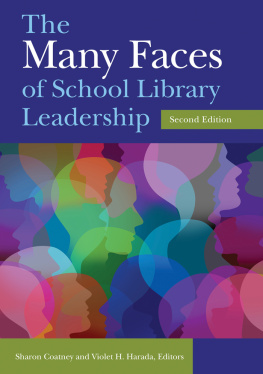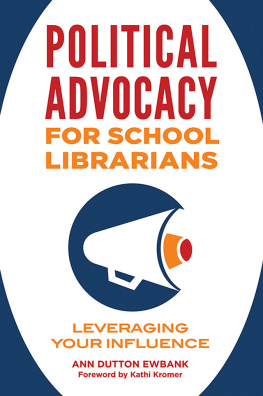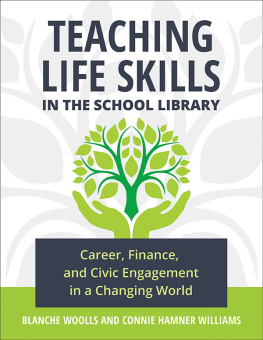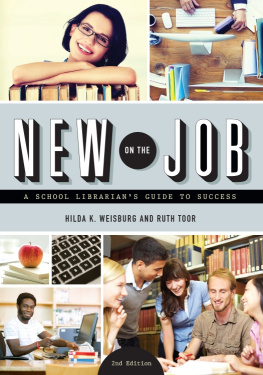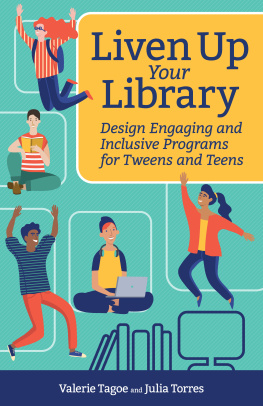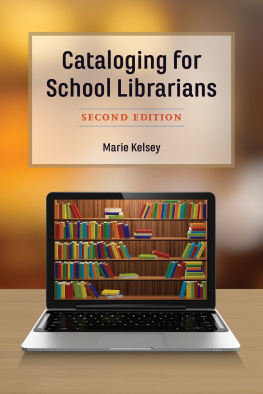THE MANY FACES OF
SCHOOL LIBRARY
LEADERSHIP
Second Edition
Sharon Coatney and
Violet H. Harada, Editors

Copyright 2017 by Sharon Coatney and Violet H. Harada
All rights reserved. No part of this publication may be reproduced, stored in a retrieval system, or transmitted, in any form or by any means, electronic, mechanical, photocopying, recording, or otherwise, except for the inclusion of brief quotations in a review, without prior permission in writing from the publisher.
Library of Congress Cataloging-in-Publication Data
Names: Coatney, Sharon, editor. | Harada, Violet H., editor.
Title: The many faces of school library leadership / Sharon Coatney and Violet H. Harada, editors.
Description: Second edition. | Santa Barbara, California : Libraries Unlimited, an imprint of ABC-CLIO, LLC, [2017] | Includes bibliographical references and index.
Identifiers: LCCN 2016053489 (print) | LCCN 2017010209 (ebook) | ISBN 9781440848971 (paperback : acid-free paper) | ISBN 9781440848988 (ebook)
Subjects: LCSH: School librariesUnited StatesAdministration. | Instructional materials centersUnited StatesAdministration. | School librarian participation in curriculum planning. | Teacher-librarians. | Leadership.
Classification: LCC Z675.S3 M36 2017 (print) | LCC Z675.S3 (ebook) | DDC 025.1/978223dc23
LC record available at https://lccn.loc.gov/2016053489
ISBN: 9781440848971
EISBN: 9781440848988
21 20 19 18 171 2 3 4 5
This book is also available as an eBook.
Libraries Unlimited
An Imprint of ABC-CLIO, LLC
ABC-CLIO, LLC
130 Cremona Drive, P.O. Box 1911
Santa Barbara, California 93116-1911
www.abc-clio.com
This book is printed on acid-free paper 
Manufactured in the United States of America
Contents
Sharon Coatney
Ken Haycock
Violet H. Harada with Lori Ezaki Chun, Patricia Louis, and Audrey Okemura
Deborah D. Levitov
Elizabeth A. Burns
Helen R. Adams and Christine Eldred
Judi Moreillon
Anthony Tilke
Kristin Fontichiaro
Debbie Abilock
Connie Williams and Blanche Woolls
David V. Loertscher
Introduction
Sharon Coatney
To begin, Vi Harada and I offer our heartfelt thanks to all of the experts, who generously contributed their knowledge and wisdom to this expanded second edition of The Many Faces of School Library Leadership, which examines the many distinct paths of school library leadership and how to inspire people to lead in all these areas. This collective enterprise provides a rich store of practical advice on exerting leadership in your school library.
When I was in graduate school studying to become a principal, I had a professor who introduced a new word and a new book every day. These were all sorts of words and bookswhatever caught his fancy. Aardvarks to tintinnabulationthere was no real theme. Sometimes it was a reference book he liked or an educational text, but just as often it was a picture book or a junior novel. He just loved books and words and loved to read and share. He was a lifelong learner and had the soul of a librarian. He was a professor of school administration, had a doctorate in education, was the sitting dean of the school of education, taught the courses in school leadership, and was a current student in the MLS program in the universitys library school. He was interested in learning about the world view held by librarians, the framework for knowledge management, and all the new technology tools as well as more about books.
He led by example, by his expertise, and by inspiration. If I had not already been a book lover, I would have been one after a semester listening to his daily examples. Of the many things that he taught me that year, one idea in particular stuck with me. He talked about the complexity of schools and the challenge of leadership in such a complex environment of students and parents and teachers and staff and curriculum and standards and facilities and buildings and grounds and on and on. After that semester, I began to change the way I looked at my own job as an elementary school librarian. Leadership in my school library was far more complex than I perhaps had thought. I was a book person. I loved books and words. I liked to do research. I loved telling stories and planning school-wide curricular events. I even occasionally enjoyed the challenge of learning a new technology tool, but there were things about my school library that I did not enjoy doing and I really think I defined my library by what I liked to do. It was kind of like the old story of the Blind Men and the Elephant or as Ed Young presents it as Seven Blind Mice.
I am not sure that I always saw the forest for the trees. I think the big picture of school librarianship sometimes eluded me. But I began to listen to my colleagues in the school district, to the other librarians, to the teachers, to the administrators, and to the kids and their parents. From the kids, I had comments like, Mrs. Coatney, did you ever meet a book you didnt like? and from parents, Have you heard of that new program where they track all the kids reading and test them after every book to determine their level? I think that would be a good program for us. and from teachers, Will you just give me a list of what Johnny has checked out and I can search his desk and his backpack? and I just heard about a new piece of software that will teach graphing. Can we buy that for every computer in the school? Panic! Things were definitely getting out of hand. Perhaps I needed to exercise some critical leadership in things like understanding privacy laws, reading research, and budget planning and selection of materials. All areas that were just not the fun part of the job to me. I would certainly have preferred getting dressed up and telling a story to the kindergarteners!
About that time, I was elected to a national office and began traveling to state library conferences all over the nation and what I found at those conferences was really intriguing. In some places, the librarians seemed to be just interested in booksmost of the programs were about books, authors, and author visits. Sometimes the emphasis was on technology tools, sometimes on the curricular applications of technology, and sometimes the library or technical services applications. State by state and year by year, the emphasis would vary. It was as if the conference planners were saying, Libraries are about technology or Libraries are about books or Libraries are about intellectual freedom or storytelling or advocacy. And yet school libraries are about all these things and more. Libraries are about all knowledge, all learning, and all the ethical, technological implications involved. Running a school library well means not only seeing every tree in the forest but also seeing the forest. Unlike the blind men, we must see the elephant in its entirety.
And so, that is the challenge for us all: How do we exercise leadership in a school library? The job is so big, so complex, so daunting, but utterly fascinating. It is the most exhausting, the most rewarding, the most intricate, and the most mind-expanding job that I have ever had and I love it passionately. I now know that the way to do it and to do it well is to form relationships, to lead from the middle, to constantly learn, to rely on othersthe school community of learnersand to work hard and honor all learners from whom you can learn.

